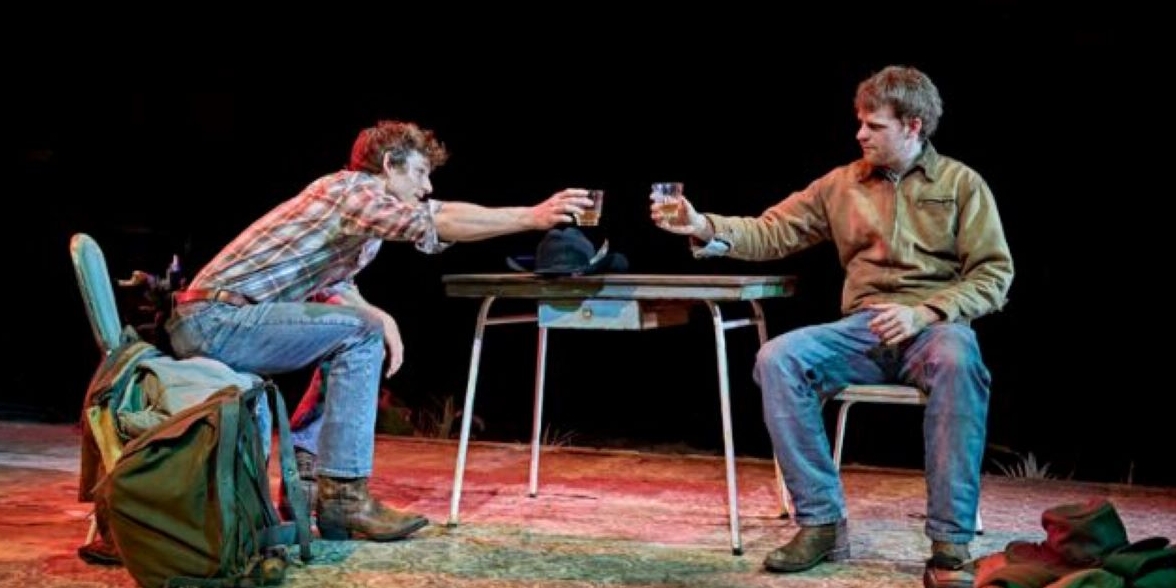Unbelievably, it is getting on for twenty years now since the making of the film of ‘Brokeback Mountain’. Such is its impact that it is hard to imagine another take on what seemed to be the definitive treatment of Annie Proulx’s account of the wrenchingly painful relationship spread over twenty years between two ranchers, who first met herding sheep on a Wyoming mountainside in 1963. In particular, Heath Ledger’s exceptional skill in making inarticulacy so emotionally expressive seemed like a performance beyond emulation. However, this new version, devised as a play with songs – rather than a musical – carves out a new and independent niche for itself as a retelling of this moving and timeless tale.
@Sohoplace is a perfect venue for this story. The intimacy of the space, structured as theatre-in-the-round, draws you into the action and allows the actors scope for finely detailed calibration of emotions that they can be confident will carry to all levels. All credit too to designer Tom Pye, for creating a set that is sufficiently flexible to suggest the bleak expanses of exposed mountainside as well as pinched domestic interiors. A bed, kitchen units and table rise and fall to the floor as needed, and a campfire springs into flame to illuminate an hard-scrabble surface of exquisite detail. Off to one side are a four-piece band and singer Eddi Reader who intervene with thirteen songs that commentate upon the action.
Ashley Robinson has performed a superlatively dexterous task in filling out the laconic dialogue of the original while leaving plenty of creative space for the actors to add their own layers of meaning. The lines we all know – ‘I wish I knew how to quit you’; ‘If you cannot fix it, you gotta stand it’; and the ever-ambiguous ‘I swear…’ – are still there. But they are surrounded now by equally resonant lines that are earthed in the stripped-down rural poverty and emotional deprivation of characters who struggle to articulate their own longings and aspirations. The respect shown to the original story and to the people who inspired it is manifest.
But a text such as this requires acting of rare delicacy and vareity to bring it into full bloom, and this it receives from an outstanding cast. Lucas Hedges has perhaps the hardest task here as the emotionally enclosed Ennis del Mar, but he makes every gesture and comment count in assembling a detailed portrayal of stoicism, repressed passion, and fear of life. Equally fine is Mike Faist in the contrasted role of Jack Twist. His charm and swagger are there from the start but also his inner sadness and frustration spread like a stain across his performance as the evening progresses. Their relationship in all its painful segments is totally involving, and the early scenes in which they edge closer to one another on the mountain are a technical marvel. There is equally strong playing from Emily Fairn as Ennis’ long-suffering wife, and Martin Marquez does a great job with three very different roles, such that you think it is a fresh actor on stage each time. Sophie Reid makes the most of her one scene of telephonic revelation.
And in a way that should be enough. My few reservations about this adaptation concern the points where the creative team depart from the mantra of ‘less is more’ that underpins Proulx’s original story. I am not sure that we really need the framing device of having an older incarnation of Ennis accompany the action, as opposed to appearing in a final coda. Paul Hickey does as much as he can with the role of silent witness, but at times he is a distraction. There is no faulting the quality of the country music in the songs, whether in the writing or the imaginative performance, but I did not think they were really needed to fill out mood or add eloquence. This is not to say that music does not matter – far from it – indeed the scene in which Ennis and Jack bond over a song with harmonica is spell-binding and crucial in the development of the action. But such is the quality of the acting and writing that you don’t feel the need, as you do in a true musical, for words to give way to music to give you full emotional completion.
However, these are relatively minor cavils in what is a thoroughly absorbing and ultimately deeply moving experience, such that, after the film, I never expected to feel again.

